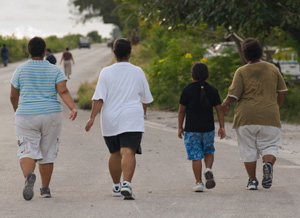World Diabetes Day raises global awareness of the impact diabetes has on people's lives. Held every year on 14 November, World Diabetes Day marks the birthday of Frederick Banting who, along with Charles Best, was crucial in the discovery of insulin–a life-saving treatment for diabetes patients.
Non-communicable diseases (NCDs), including diabetes, are the leading cause of death worldwide. The World Health Organization (WHO) estimates that more than 346 million people have diabetes globally. Almost 80 per cent of diabetes deaths occur in low and middle income countries.
The Pacific region witnesses some of the highest rates of NCDs, including diabetes, in the world. Diabetes rates are two to five times higher than the international average in some Pacific Island Countries.
Australia is helping our Pacific neighbours to respond to the diabetes burden through our regional and bilateral aid programs. We are seeing important results from this assistance.
- The Pacific Regional NCD program ($22 million from 2008–2013) has supported 21 Pacific Island Countries and Territories to develop and implement national non-communicable diseases strategies.
-
In Fiji, Australian funding is supporting:
- the development of an NCD toolkit which will, through early screening, allow for early diagnosis and intervention for diabetes and other NCDs, to help reduce ill health and premature death
- establishment of quality diabetes centres at sub-divisional hospitals and major health centres
- development of a foot-care manual for prevention of complications from diabetes leading to reduced mobility and/or amputations.
-
AusAID continues to work with the Government of Samoa through the health sector program ($12 million from 2008–2013) to address NCDs and support the development of the health workforce, including:
- the establishment of a Health Promotion Foundation–designed to be at the forefront of advocacy in promoting and fostering a national approach to health living and lifestyles
- screening for NCDs, including testing for diabetes, in more than 155 communities
- programs that promote healthy nutrition for children.
The Prime Minister announced funding of $25 million for NCDs (over four years) at the 2011 Pacific Islands Forum Leaders Meeting. Australia's health investments in the Pacific will continue to focus on the prevention and treatment of NCDs through the most cost-effective interventions to improve the health of people in our region.

